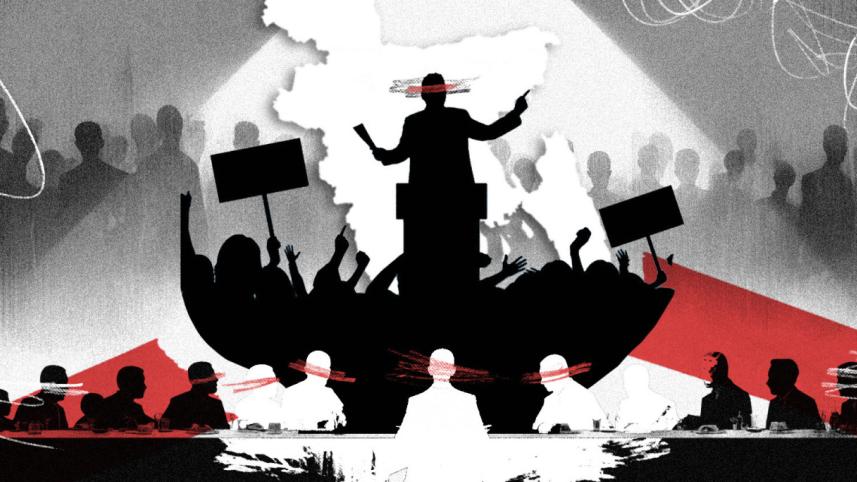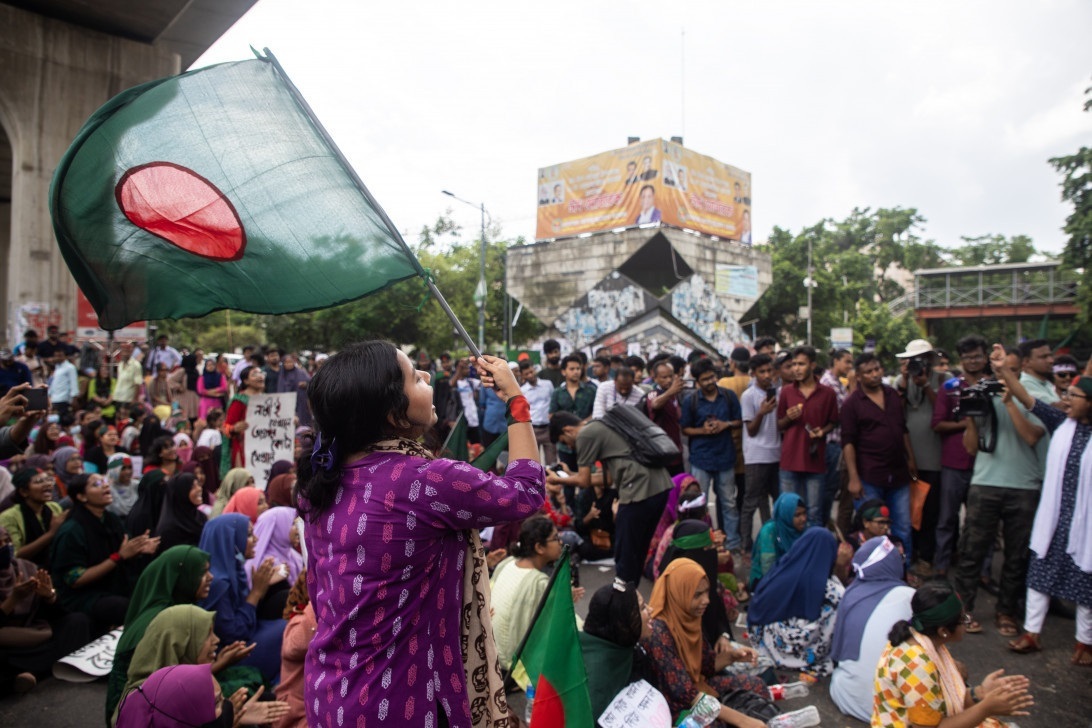Demographic dividend: Bangladesh’s future depends on who holds the mic

The average Bangladeshi is 27 years old, often seen scrolling through TikTok, brainstorming a freelancing gig, worrying about climate change, or pitching a start-up idea to friends over a cup of tea. Now picture this same young person's future being decided by someone twice their age, often with one hand on a landline and the other still figuring out Zoom's mute button.
This isn't an attack on our elders (may their phones always have signal and their hearts always be full), but it is a wake-up call. If our democracy is to truly represent the people, then we need to talk about the generational gap in governance. And it is not about the viral "Gen Boomers vs Gen Zoomers" meme war, but the very real clash of priorities, pace, and power.
Let's do the math to understand the age gap that governs the nation. Bangladesh's median age is 26 (2025), while the average age of a parliamentarian is much higher. That's not just a generation gap; it's the difference between an Instagram reel and a rotary dial tone.
Compare that with global trends: Japan and Germany are ageing, with median ages pushing 49; the US is at 39; China at 40; Europe around 45. They're worried about pensions and shrinking workforces. We, on the other hand, have a powerful asset they do not—our youth. But this asset, often referred to as our demographic dividend, won't magically transform into progress unless we harness it with vision and courage. Otherwise, we risk turning this dividend into a disaster. Let's chalk out five cracks in our democratic foundation.
First, there's a gap between parliament's voice and reality. People's voices should be echoed in a democracy. How can leaders stuck in the past truly understand the aspirations and anxieties of a generation nurtured by Artificial Intelligence (AI) and attuned to the severity of crises? As a result, issues like mental health, gig-economy rights, climate justice and tech innovation seldom reach the table, let alone become law.
Second, the pace gap between generations. Young Bangladeshis launch start-ups over the weekend and lead digital movements in minutes. Our laws? They often arrive at the speed of a bureaucratic train stuck in traffic. As a result, by the time policies are rolled out, the world and our youth have already moved on.
Third, the priorities gap. While AI, creative tech, and remote freelancing are already driving the job market, MPs might be stuck arguing over fertiliser pricing. As a result, outdated policies force young people to use analogue-era instructions to navigate a digital economy.
Fourth, the power gap. Young people are courted during campaigns to manage social media, rally crowds, hand out flyers and so on. But when it comes to leadership? Suddenly, the ladder disappears. As a result, fresh ideas suffocate under party hierarchies, and democratic trust withers.
Fifth, the participation gap—being politically homeless online. Our youth dominate Facebook, Instagram, YouTube, TikTok, and Reddit. But how often do you see a policymaker genuinely engage in these spaces? As a result, youth aren't disengaged; they're just disconnected from a political system that refuses to meet them where they are.
However, are we doomed? Not quite. Bangladesh has a golden window, perhaps once in a century. We've already done the heavy lifting: literacy has jumped from just 16.8 percent in 1971 to 78 percent in 2021. The next leap should be from literacy to leadership. Here's how we can flip the script by adopting a few practical ways to hand over the mic.
First, we must lower the age limit so young people can truly run for office, with meaningful quotas for under-35s in party nominations. Second, we need to bring governance into the digital age by forming a digital democracy task force that makes consultations and feedback easy and accessible online. Third, let's establish a real national youth parliament—not simply a token speech and a picture in identical T-shirts. Let their ideas shape policy. Fourth, imagine pairing experienced MPs with passionate young policy apprentices to co-create with them rather than shadow them. Their experiences, coupled with energy, will lead to actual progress. Fifth, let's teach politics, not just patriotism. Teach students how the system works, what rights they have and how laws are made.
A final thought: if it doesn't carry our voices, share our struggles, or dream our dreams, is it really ours to believe in? Democracy isn't just voting once every few years; it's about having a visible, vibrant and vocal presence in every space where decisions are made. If our lawmakers don't reflect the majority in age, mindset, and priorities, then we aren't building a democracy. It's like watching a black-and-white film in a world streaming in 4K.
It's time we value dedication over designation, sincerity over seniority, values over valuables, effort over outcome, and real work over paperwork. And let's not forget progress: it's not possible with male chauvinism; true development must be measured by the position of women in society. Any leader ignoring that fact is not leading us forward. Let's move beyond zero-sum games. Real progress happens when everyone has a chance to win. That's what good negotiation and good leadership are all about.
As debates swirl over national charters, PR systems, and bicameral parliaments, one truth remains: the future belongs to the young, and they deserve a real say in shaping it. Let us honour the wisdom of those who walked before us, and let youth go from voices in the crowd to voices in command.
Saeed Ahmed Siddiquee is a monitoring evaluation and learning practitioner and a senior development professional. He can be reached at shaikatbangla@gmail.com.
Sharmin Labonno is a gender and youth empowerment expert at The Hunger Project Bangladesh. She can be reached at labonnosharmin.ju@gmail.com.
Views expressed in this article are the authors' own.
Follow The Daily Star Opinion on Facebook for the latest opinions, commentaries, and analyses by experts and professionals. To contribute your article or letter to The Daily Star Opinion, see our guidelines for submission.


 For all latest news, follow The Daily Star's Google News channel.
For all latest news, follow The Daily Star's Google News channel. 

Comments